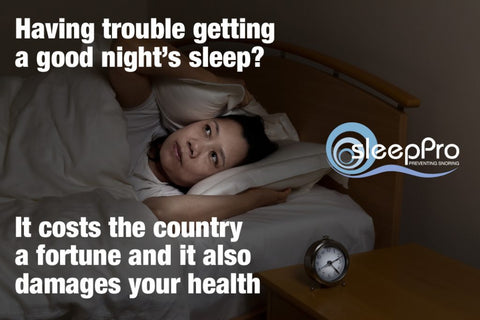Sleep-deprived workers are costing the world economy billions every year and those involved also face a much higher risk of an earlier death as a result. The calculation is based on tired employees being less productive or absent from work altogether says a new study of 62,000 workers.

The study evaluated the economic cost of insufficient sleep in the UK, US, Canada, Germany and Japan, and said the loss equated to an average of 1.86% of economic growth across the total number of countries evaluated.
The main impact was on health, with those sleeping less than six hours a night 13% more likely to die earlier than those getting seven to nine hours sleep each night.
Even though the impact of tired workers in the UK may sound bad, it still ranked better than both the US and Japan which lost the most working days due to lack of sleep. According to the study, the ‘healthy sleep range’ is anywhere between seven and nine hours per night.
In rank order, starting with the worst measured, the figures are as follows:
1. The USA loses 1.2 million working days a year, costing the country $411bn (£328bn) or 2.28% of GDP
2. Japan loses 600,000 working days a year, costing them $138bn or 2.92% of GDP
3. The UK loses 200,000 working days a year, costing the country about £40bn, or 1.86% of GDP
4. Germany loses 200,000 working days a year, costing $60bn, or 1.56% of GDP
5. Canada loses 80,000 working days a year, costing them $21.4bn or 1.35% of GDP
It is anticipated that similar figures, or perhaps worse for some, exist in all the other more advanced nations such as Australia, New Zealand, other European countries, and those in Asia.
Separate figures published for Australia state that sleeping conditions such as sleep apnoea cost the Australian community more than $5 billion a year in health and indirect costs, with the impact to quality of life estimated to be worth more than AUD $31 billion a year. It is growing worse as a problem year by year according to the Australasian Sleep Association.
The new report called on employers to recognise and promote the importance of sleep, even urging them to build nap rooms for staff to use. It said they should also discourage staff from “extended use” of electronic devices after working hours, and individuals were advised to wake up at the same time each day and exercise during the day to improve their sleep.
“The effects from a lack of sleep are massive. Sleep deprivation not only influences an individual’s health and well-being but it has a significant impact on a nation’s economy,” said Marco Hafner, a research leader at Rand Europe and the report’s main author.
Mr Hafner said that even small changes could make a big difference, adding that if those people in the UK who were currently sleeping under six hours a night increased this to between six and seven hours, it would add £24bn to the UK’s economy immediately.
In the US alone, the average worker loses 11.3 working days or $2,280 (£1,700) of productivity per year due to sleep deprivation, according to a report done by the American Academy of Sleep Medicine. It has become so important now in the US that some companies pay their staff to sleep.
The staff at insurance group Aetna, are paid an extra $300 each year to get a good night’s sleep. Such is the US firm’s concern about the impact of sleep deprivation on employee performance, that it encourages its workers to sign up to a scheme that rewards them for getting at least seven hours of shut-eye per night. Aetna staff that participate earn $25 for every 20 nights in which they sleep over seven hours or, up to a limit of $300 in 12 months.
Introduced in 2014, 17,300 of the firm’s 49,500 employees participated last year, an increase from 12,300 in 2014. Staff are trusted to manually record how long they have slept every night. The firm’s staff are also given extra funds if they do exercise.
Insomnia, snoring, and sleep apnoea are the biggest causes, made worse by other things such as stress, alcohol, eating late and ‘blue light’ activity. All of these can be controlled and inexpensive, medically approved stop snoring appliances are available easily online.
